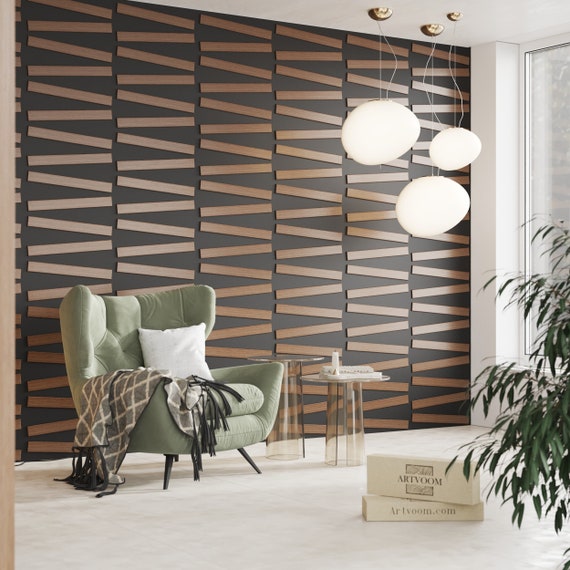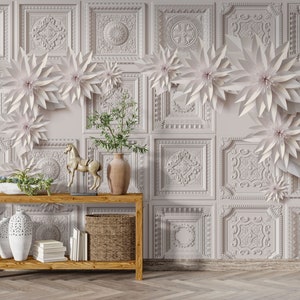Are you looking to elevate your home decor without the hassle of traditional remodeling? Peel and stick decorative wall panels could be your perfect solution! As someone who has experimented with various home improvement products, I can confirm that these panels are a game-changer. They offer a blend of aesthetics, convenience, and affordability that is hard to beat. In this comprehensive guide, we will delve into every aspect of peel and stick decorative wall panels, their benefits, drawbacks, installation process, and some tips to help you choose the right ones for your space.
What Are Peel and Stick Decorative Wall Panels?
Peel and stick decorative wall panels are lightweight wall coverings designed for easy installation. They typically come with an adhesive backing, allowing you to simply peel off the protective paper and stick them directly to your walls or other surfaces. These panels can mimic a variety of materials, such as wood, stone, brick, and more, providing a stylish alternative to traditional wall treatments.
Benefits of Peel and Stick Decorative Wall Panels
Peel and stick wall panels offer numerous advantages. Let’s take a closer look at some of the most significant benefits:
1. Easy Installation
One of the primary draws of peel and stick wall panels is their straightforward installation process. You don’t need to be a DIY expert or hire a professional—most people can complete the installation in a weekend.
2. Versatility
These panels are available in various designs and materials, making it easy to find a style that complements your existing decor. Whether you prefer rustic wood finishes or sleek modern designs, there’s something for everyone.

3. Cost-Effective
Compared to traditional wall coverings, peel and stick panels are typically more affordable. Plus, you save on labor costs since you can do it yourself.
4. Removable and Reusable
If you ever decide to redecorate, these panels can be removed with minimal damage to your walls, making them ideal for renters or anyone who loves to change things up frequently.

5. Low Maintenance
Peel and stick panels are generally easier to clean and maintain than painted walls, as many are made from materials that resist stains and wear.
Types of Peel and Stick Decorative Wall Panels
There are several types of peel and stick decorative wall panels available on the market today. Here are some of the most popular options:

1. Wood Panels
Wood faux panels add a natural, rustic charm to any room. They come in various finishes and textures, giving your space an authentic wood appearance without the hefty price tag.
2. Brick Panels
For an industrial vibe, brick peel and stick panels are a fantastic choice. They provide a textured look that can enhance both modern and vintage interior designs.

3. Stone Panels
Stone panels offer a luxurious feel and are an excellent way to create a focal point in any room. The variety of colors and textures available means you can find something that fits your style.
4. 3D Panels
If you’re looking for a more contemporary look, 3D panels can add depth and dimension to your walls. These panels create an eye-catching design element that can transform a plain space into a stunning one.

Installation Process for Peel and Stick Decorative Wall Panels
Installing peel and stick wall panels is easier than you might think. Here’s a step-by-step guide based on my personal experience:
Step 1: Prepare the Wall
Ensure that the wall surface is clean, dry, and free from dust. Wipe it down with a damp cloth and allow it to dry completely. For optimal adhesion, smooth surfaces work best.

Step 2: Measure and Plan
Measure the wall space where you plan to install the panels. Planning the layout before sticking them on can help prevent mistakes. I recommend using a level to draw a straight line as a guide.
Step 3: Cut the Panels (if needed)
Depending on your measurements, you might need to cut some panels to fit around outlets or corners. Use a utility knife for precise cuts.

Step 4: Peel and Stick
Carefully peel off the backing paper of the panel and align it with your guide line. Press firmly to ensure it adheres to the wall. Start from one corner and work your way across the wall.
Step 5: Seamless Finish
If you have multiple panels, ensure that the seams align well. You might want to use a roller or your hands to press down on the seams for a seamless appearance.
Step 6: Clean Up
Once all panels are in place, wipe down any excess adhesive (if applicable) and step back to admire your work!
Comparison Table of Popular Peel and Stick Decorative Wall Panels
| Panel Type | Material | Installation Ease | Durability | Cost |
|---|---|---|---|---|
| Wood Panels | Faux Wood | Easy | High | Moderate |
| Brick Panels | Polypropylene | Easy | Medium | Moderate |
| Stone Panels | Foam/Plastic | Easy | High | High |
| 3D Panels | PVC | Medium | Medium | Moderate |
Pros and Cons of Peel and Stick Decorative Wall Panels
As with any home improvement option, peel and stick decorative wall panels come with their own set of advantages and disadvantages. Here’s a breakdown:
Pros
- Easy and quick installation.
- Wide variety of styles and designs available.
- Cost-effective compared to traditional wall treatments.
- Removable and reusable, making them perfect for renters.
- Low maintenance and easy to clean.
Cons
- Adhesion may weaken in high humidity areas.
- Not as durable as traditional wall treatments in high-traffic areas.
- Can peel off if not installed correctly.
Choosing the Right Peel and Stick Decorative Wall Panels
With so many options on the market, selecting the right peel and stick wall panels can be overwhelming. Here are some tips based on my experiences:
1. Consider Your Space
Think about the room’s purpose and how much wear and tear the walls will endure. For high-traffic areas, opt for more durable materials.
2. Style Matching
Choose panels that complement your existing decor. Whether you want to create a feature wall or enhance the overall theme, pick styles that harmonize with your home.
3. Read Reviews
Before making a purchase, read customer reviews to ensure the product quality meets your expectations.
4. Measure Twice
Always double-check your measurements to avoid purchasing more panels than you actually need, which can lead to wasted materials and money.
Frequently Asked Questions (FAQs)
1. How do I remove peel and stick wall panels?
To remove peel and stick decorative wall panels, carefully peel them off starting from one corner. If they don’t come off easily, you can use a heat gun or hairdryer on low to soften the adhesive before peeling.
2. Can I paint peel and stick wall panels?
It is not recommended to paint peel and stick wall panels as this can damage the surface and affect their adhesion. If you want a different color, it’s best to replace the panels entirely.
3. Are peel and stick wall panels waterproof?
Most peel and stick wall panels are water-resistant, but not fully waterproof. It’s advisable to avoid using them in high-moisture areas, such as shower stalls.
4. How long do peel and stick wall panels last?
With proper installation and care, peel and stick wall panels can last several years. However, the longevity can vary based on the material and the conditions in your home.
5. Can I use peel and stick panels outdoors?
While some panels are designed for outdoor use, most are meant for indoor applications. Check the product specifications to ensure they are suitable for outdoor environments.
Conclusion
Peel and stick decorative wall panels are an excellent option for anyone looking to update their living space without the stress of traditional renovations. With their ease of installation, affordability, and variety of styles, they provide a unique way to express your personal style. Whether you’re a seasoned DIY enthusiast or a novice looking to make a change, these panels offer the perfect blend of creativity and convenience. So why wait? Transform your space today!